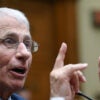With Congress and President Barack Obama ramping up their health care reform rhetoric this week, it seems all of the major players in the health policy arena are weighing how likely meaningful health care reform will pass and be doable for Americans and the private health care system.
One theme everyone seems to be in agreement with is that any health care legislation must have broad support to actually pass and be implemented. “If Congress wants long-lasting health care reform, they’ll need broad consensus on what that is,” Heritage’s Nina Owcharenko said at a health care briefing on Capitol Hill earlier this week.
Broad consensus means forgoing some of the more contentious health policy components that threaten to dissolve health reform efforts — much like what happened during the Clinton health reform efforts in 1993 — Owcharenko noted. The Health Policy Consensus Group, a coalition of free-market think tanks of which Heritage is a member, already has identified deal breakers that consumers should be aware of during the health care debates. Those include:
• A government-run health insurance plan
• Mandates on businesses or individuals to buy health insurance
• Government-defined benefits packages
• Any national health insurance exchange that would expand federal regulatory powers over private insurance
• Washington gaining more decision making power
Former Health and Human Services Secretary Mike Leavitt and former Sen. Tom Daschle (who was the first pick for the current administration’s HHS Secretary before tax issues brought down his nomination) also noted the importance of a bipartisan health reform bill yesterday during a friendly verbal spar at the National Press Club.
“I believe there is only a 50-50 chance that something will pass,” said Daschle, who has pushed for policymakers to adopt a public health plan, Federal Health Board and “evidence-based” medicine processes like comparative effectiveness research.
Leavitt followed up that he was more certain “something will pass. But the question is what [kind of health reform design] will [the legislation] be?” He warned the audience that reform components like a public health insurance plan would lead the largely private health industry into a government-run health system.
Instead, Leavitt highlighted broad health reform ideas that mirrored those made by the Health Policy Consensus Group:
• Preserve the innovative and high-quality initiatives in the private health care system
• Changes must be done, but through innovative ways that don’t include more central decision making power for D.C. bureaucrats
• Empower patients and doctors to make better health care decisions on their own for the long term
“The only way we will ever make the hard decisions we need to make in health reform is to create an environment where consumers can make these decisions and start that change. Government can organize that marketplace where decisions are made, but it should not own the health care system,” Leavitt said.





























